
"Burning Love" is a 1972 song by Elvis Presley, written by Dennis Linde, originally released by Arthur Alexander earlier in 1972. Presley found major success with the song, it becoming his final Top 10 hit in the American Hot 100 or pop charts, peaking at number 2.

"An American Trilogy" is a 1972 song medley arranged by country composer Mickey Newbury and popularized by Elvis Presley, who included it as a showstopper in his concert routines. The medley uses three 19th-century songs:
Milton Sims "Mickey" Newbury Jr. was an American singer-songwriter and a member of the Nashville Songwriters Hall of Fame.

Dennis Linde was an American musician and songwriter based in Nashville who has had over 250 of his songs recorded. He is best known for writing the 1972 Elvis Presley song, "Burning Love", an international hit that has been featured in at least five motion pictures. In 1994, Linde won BMI's "Top Writer Award" and received four awards as BMI's most-performed titles for that year. He never liked publicity, and shunned awards shows to the extent of having family members collect his awards for him. He wrote both words and music for most of his songs, rarely collaborating with co-writers. He earned 14 BMI "Million-Air" songs. In 2001, he was inducted into the Nashville Songwriters Hall of Fame.
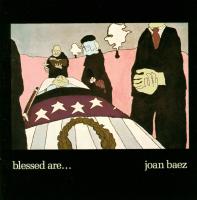
Blessed Are... is the twelfth studio album by Joan Baez and her last with Vanguard Records, released in July 1971. It included her hit cover of The Band's "The Night They Drove Old Dixie Down" and songs by Kris Kristofferson, the Beatles, Jesse Winchester, and The Rolling Stones as well as a significant number of Baez' own compositions. Like its immediate predecessors, the album was recorded in Nashville and had a decidedly country feel.

Promised Land is the twenty-first studio album by American singer and musician Elvis Presley, released by RCA Records on January 8, 1975. It was recorded in December 1973 at Stax Records studios in Memphis and released on Presley's 40th birthday in January, 1975. In the US the album reached number 47 on the Billboard Top 200 chart and number 1 in Billboard's Top Country LPs chart, as well as the Cashbox Country albums chart. In the UK the album reached #21.

Good Times is the twentieth studio album by American singer and musician Elvis Presley, released on March 20, 1974. The album was constructed by the first pick of a session held at Stax Studios in Memphis in December 1973 and two songs, "I've Got a Thing About You Baby" and "Take Good Care of Her", which were left over from the session at Stax in July 1973. The album includes a collection of songs that vary in style and genre. Released the same day as the recording of Elvis: Recorded Live on Stage in Memphis was being made, the title was taken from the song "Talk About the Good Times". Many of the songs are covers of hits at the time, like "Spanish Eyes" and "She Wears My Ring". Charting low at the time of its release, it was considered typical 1970s Elvis material and was his first album to hit the "cut-out bins". The album did have some success though upon its original release, becoming a Cashbox Country Albums number 1 hit and charting in the Top 50 in the UK.
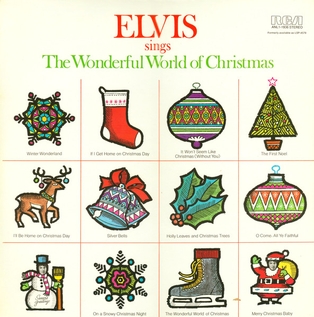
Elvis Sings The Wonderful World of Christmas is the fifteenth studio album and second christmas album by American singer Elvis Presley, released by RCA Records in October, 1971. It was Presley's first collection of new Christmas recordings since Elvis' Christmas Album (1957). Two songs from the album, "Merry Christmas Baby" and "O Come All Ye Faithful", were issued as a single in November, 1971. The album topped the Christmas LP's chart that year and would have charted high on the Billboard Top LPs chart, but from 1963 to 1973, holiday albums were not allowed to chart. Though lacking the commercial appeal of Elvis' Christmas Album from 1957, it gradually became a perennial favorite. In 1976, the album was reissued in the mid-priced RCA Pure Gold series with a new catalog number (ANL1-1936). The LP was certified Gold on November 4, 1977, Platinum on December 1, 1977, 2× Platinum on May 20, 1988, and 3× Platinum on July 15, 1999, by the RIAA.

His Hand in Mine is the fifth studio album by American singer and musician Elvis Presley, released on November 23, 1960 by RCA Victor in mono and stereo, catalog number LPM/LSP 2328. It was the first of three gospel albums that Presley would issue during his lifetime. Recording sessions took place on October 30 and 31, 1960, at RCA Studio B in Nashville, Tennessee. It peaked at #13 on the Top Pop Albums chart. It was certified Gold on April 9, 1969 and Platinum on March 27, 1992 by the Recording Industry Association of America.
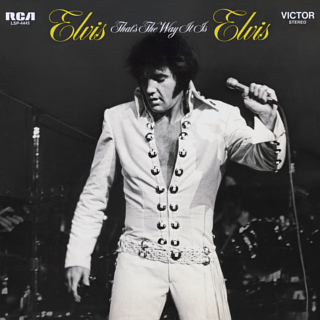
That's the Way It Is is the twelfth studio album by American singer and musician Elvis Presley, released on RCA Records, LSP 4445, in November 1970. It consists of eight studio tracks recorded at RCA Studio B in Nashville, and four live in-concert tracks recorded at The International Hotel in Las Vegas. It accompanied the theatrical release of the documentary film Elvis: That's the Way It Is, although it is not generally considered a soundtrack album. The album peaked at number 21 on the Billboard 200 and at number eight on the country chart. It was certified Gold on June 28, 1973, by the Recording Industry Association of America and up-graded to Platinum, for sales of a million copies on March 8, 2018.

Walk a Mile in My Shoes: The Essential '70s Masters is a five-disc box set compilation of the recorded work of Elvis Presley during the decade of the 1970s. It was released in 1995 by RCA Records, catalog number 66670-2, following similar box sets that covered his musical output in the 1950s and both his non-soundtrack and soundtrack work of the 1960s. This set's initial long-box release included a set of collectable stamps duplicating the record jackets of the LP albums on which the tracks in the box set were originally released by RCA. It also includes a booklet with an extensive session list and discography, as well as a lengthy essay by Dave Marsh, some of it excerpted from his 1982 book on Presley. The box set was certified gold by the Recording Industry Association of America on July 15, 1999.

Tattoo is an album by country musician David Allan Coe, released in 1977 on Columbia Records.

Looks Like Rain is a 1969 concept album by singer-songwriter Mickey Newbury. After recording his debut album with RCA, Newbury was dissatisfied with the resulting album and left RCA to pursue a style closer to his tastes. Recorded at Cinderella Sound, as his next two albums would be, the result is widely considered his first real recording and represents a peak in the singer songwriter movement, especially for Nashville. The sound and style of the record would be highly influential during the Outlaw Movement during country music in the 1970s especially on albums by David Allan Coe and Waylon Jennings. Linking the tracks with delicate arrangements and liberal amount of atmosphere, the record contains some of Newbury's most celebrated compositions including "She Even Woke Me Up to Say Goodbye", "33rd of August", "I Don't Think Much About Her No More", and "San Francisco Mabel Joy". AllMusic's review of the album concludes, "Looks Like Rain is so fine, so mysterious in its pace, dimension, quark strangeness and charm, it defies any attempt at strict categorization or criticism; a rare work of genius."
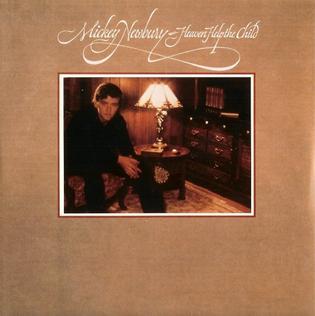
Heaven Help the Child is a 1973 studio album by country singer-songwriter Mickey Newbury. The album was Newbury's third consecutive release recorded at Cinderella Studios. Noted for its dramatic remakes of four previous Newbury songs: "Sweet Memories" and "Good Morning Dear" from Harlequin Melodies, "Sunshine" from Sings His Own, and "San Francisco Mabel Joy" from Looks Like Rain, the album is considered equal among Newbury's acclaimed Looks Like Rain and Frisco Mabel Joy. Apart from its definitive versions of three of Newbury's early songwriting hits, the album is also acclaimed for its title track, with its multi-generational narrative, the haunting "Cortelia Clark", and the bluegrass classic "Why You Been Gone So Long". In his AllMusic review of the LP, Thom Jurek declares, "Newbury, for the third time in as many recording sessions, came up with a record that defies categorization. And for the third time in a row, he had done the impossible, created a masterpiece, a work of perfection."
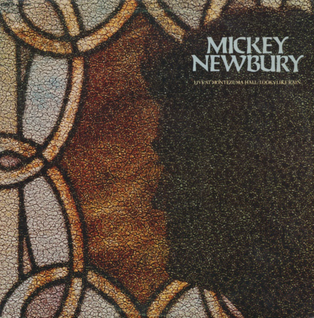
Live at Montezuma Hall is the first live album from singer-songwriter Mickey Newbury, recorded at Montezuma Hall at San Diego State University in 1973. Featuring Newbury performing solo with an acoustic guitar, the album is notable for touching renditions of many of Newbury's excellent songs and for his personable and humored performance. The set was not edited for the album.

The Mickey Newbury Collection collects the ten albums Mickey Newbury released on three labels between 1969 and 1981 on an eight disc set. The set was released and is available through Mountain Retreat, a label run by Newbury and later Newbury's family. While Newbury had an impressive reputation as an artist and songwriter, at the time of the set's release in 1998, these recordings had been out of print for years. The original master tapes were lost by the labels, and so the recordings on the collection are digital transfers from virgin vinyl copies. The packaging replicates the original album art.
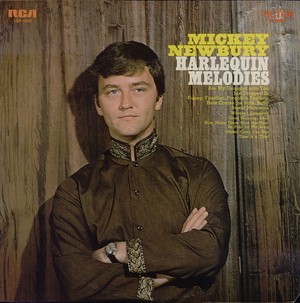
Harlequin Melodies is the 1968 debut album by singer-songwriter Mickey Newbury. Newbury was already a successful songwriter in Nashville, signed by Acuff-Rose Publishing. At one point he had four #1 hits on different charts for Eddy Arnold, Solomon Burke, The First Edition, and Andy Williams, and he had written hits for several others. Produced by Elvis Presley producer Felton Jarvis, Harlequin Melodies concentrates on Newbury's versions of his hit songs; nearly every song on the album has been covered by other artists.
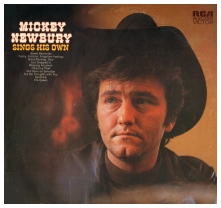
Sings His Own is the 1972 compilation album by singer-songwriter Mickey Newbury, a revised edition of his debut Harlequin Melodies, released by RCA Records in 1972, after the critical notice of Newbury's highly acclaimed Looks Like Rain and Frisco Mabel Joy. Newbury's RCA debut heavily featured songs that had been made into hits by other artists, and there is not much difference between that set and this one. Newbury largely disowned his RCA recordings, considering 1969's Looks Like Rain his true debut, and this album bears little stylistic similarity to anything else in his catalog.
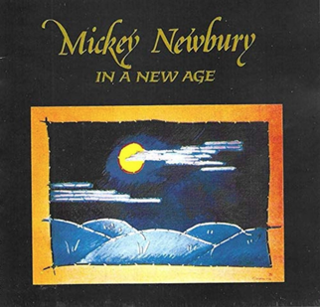
In a New Age is a 1988 album by the singer-songwriter Mickey Newbury. It contains new versions of eight classic Newbury songs, with a full version of "All My Trials" which is part of Newbury's "An American Trilogy"

An American Trilogy is a box set of three remastered albums by Mickey Newbury recorded between 1969 and 1973 at Cinderella Sound, in Madison, Tennessee, alongside an additional album of rare and unreleased recordings, entitled Better Days. It was released in 2011 on Saint Cecilia Knows, in association with the Newbury family and their label Mountain Retreat. The box includes the albums Looks Like Rain, Frisco Mabel Joy and Heaven Help The Child. All three albums have been remastered for the first time on CD from the original master tapes, long thought to have been destroyed in a fire.



















